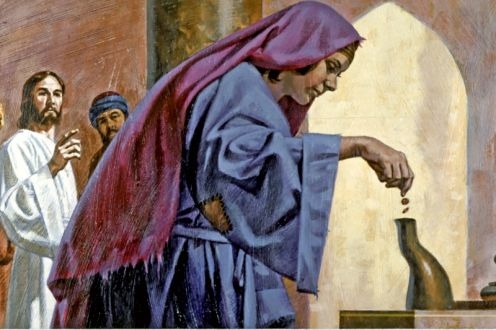32nd Sunday in Ordinary Time

Gospel Reading
Mk 12: 41-44
41He sat down opposite the treasury, and watched the crowd putting money into the treasury. Many rich people put in large sums. 42A poor widow came and put in two small copper coins, which are worth a penny. 43Then he called his disciples and said to them, “Truly I tell you, this poor widow has put in more than all those who are contributing to the treasury. 44For all of them have contributed out of their abundance; but she out of her poverty has put in everything she had, all she had to live on.”
Pointer for Sunday Homily
Context of the “Widow’s Offering” Narrative
The narrative about the offering of the widow in the temple treasure is situated within the literary context of the Gospel of Mark called “the Ministry of Jesus in Jerusalem.” From chapters 11-13 Jesus moves about preaching in Jerusalem. The succeeding chapter (14) begins the passion death and resurrection narrative. Quite interesting is that, as we are moving toward the liturgical celebration of the birth of Christ our readings lead us to his death. This simply underscores that the reason for his birth is his life giving sacrifice for us.
The narrative of the ministry of Jesus in Jerusalem (chs. 11-13) is prefaced and bracketed by the metaphor of the “fig tree”. In Mk 11: 12-14, Jesus pronounced the perpetual barrenness of the fig tree because it had no fruit; and in Mk 13: 28-31, Jesus, after the prediction of the destruction of the temple, picked up the same image saying “from the fig tree learn its lesson….”
A closer look at the image of the fig tree reveals that it points to the grand and magnificent temple of Jerusalem. This temple representing religion, culture, arts, influence and power is under a bitter criticism from Jesus—the Messiah. In 11:15-19, Jesus cleanses the temple declaring, “my house shall be called a house of prayer for all nations? But why have you made it a den of robbers?” In 13: 2, Jesus predicts its total destruction, “… not one stone will be left here upon another, all will be thrown down.” In between these narratives of cleansing and destruction of the temple are confrontations between Jesus and the leaders of the time with their test questions to traps Jesus and related false religious bankruptcy: The chief priests, the scribes and the elders were questioning Jesus’ authority (11: 27-32); the Pharisees and Herodians desired to trap Jesus whether it was lawful to pay taxes to the emperor (12: 13-17); the Sadducees who were non believers on the resurrection came with questions related to matrimony (12: 18-27); and the scribes whose spirituality of appearance and external show but “devour widow’s houses” are made as negative example and warning to not follow for believers by Jesus (12:38-40).
The widow’s contribution from “poverty”
Against this background—the magnificent and grand structure but decrepit moral standards, questionable ethical behaviors, and an impoverish spirituality—the offering of a poor widow “out of her poverty” and putting everything she had is a shout-out of, on the one hand, the greatest institutional injustice against the poor and, on the other hand, the honest and devout intentions of the simple to maintain even, at the cost of their poverty, an unjust structure.
For those who have surplus, to contribute to a system of injustice does hurt but not much. But for those who have not, the honest offering is itself an insult to justice and an indictment against injustice.
The Modern-Widow’s Contribution from Poverty
The message of the widow’s contribution from poverty reverberates today. These modern stories could take various faces: the morally appalling “laglag bala” incident where those in authority prey over the unsuspecting and gullible victims, using the hard consequences of the law, but only to exact money from them, and the victim has no other recourse but to pay; the corruption in our military and other branches of government for the last centuries leaving the country today with no might to defend her territorial boundaries—we have become like the poor widow putting in a pittance and hoping against hope for international resolutions in our favor; the denudations of our mother earth, where the conglomerates heap up money for themselves leaving the poor residents with denuded forests and destroyed ancestral homes; the high tax rates paid by the ordinary populace only to end up in the pockets of the corrupt and the campaign kits by the powerful.
The Challenge of the “contribution from poverty”
The widow’s contribution from poverty is therefore a prophetic act for societal change. Only in divesting oneself, by emptying the mind from self interest, from the corruptions of sins from the heart, only by cleansing one’s conscience and acting from the a pure heart will change truly come. Contributing from surplus, but retaining still the stain of sin, arrogance, selfishness, and wanton desire for self-gratification mean nothing and effect nothing.
The act of the widow to contribute from poverty is likewise prophetic because it points forward to the action of Jesus’ greatest self sacrifice of his life so that in his death we achieve a new life, in his sacrifice we live, and in his baptism of death we receive a baptism of life. And this challenge is not only for the few but to every believer of Jesus Christ, every baptized, and every citizen of the kingdom of heaven be white or colored, strong or weak, rich or poor.
Fr.’der, oar
